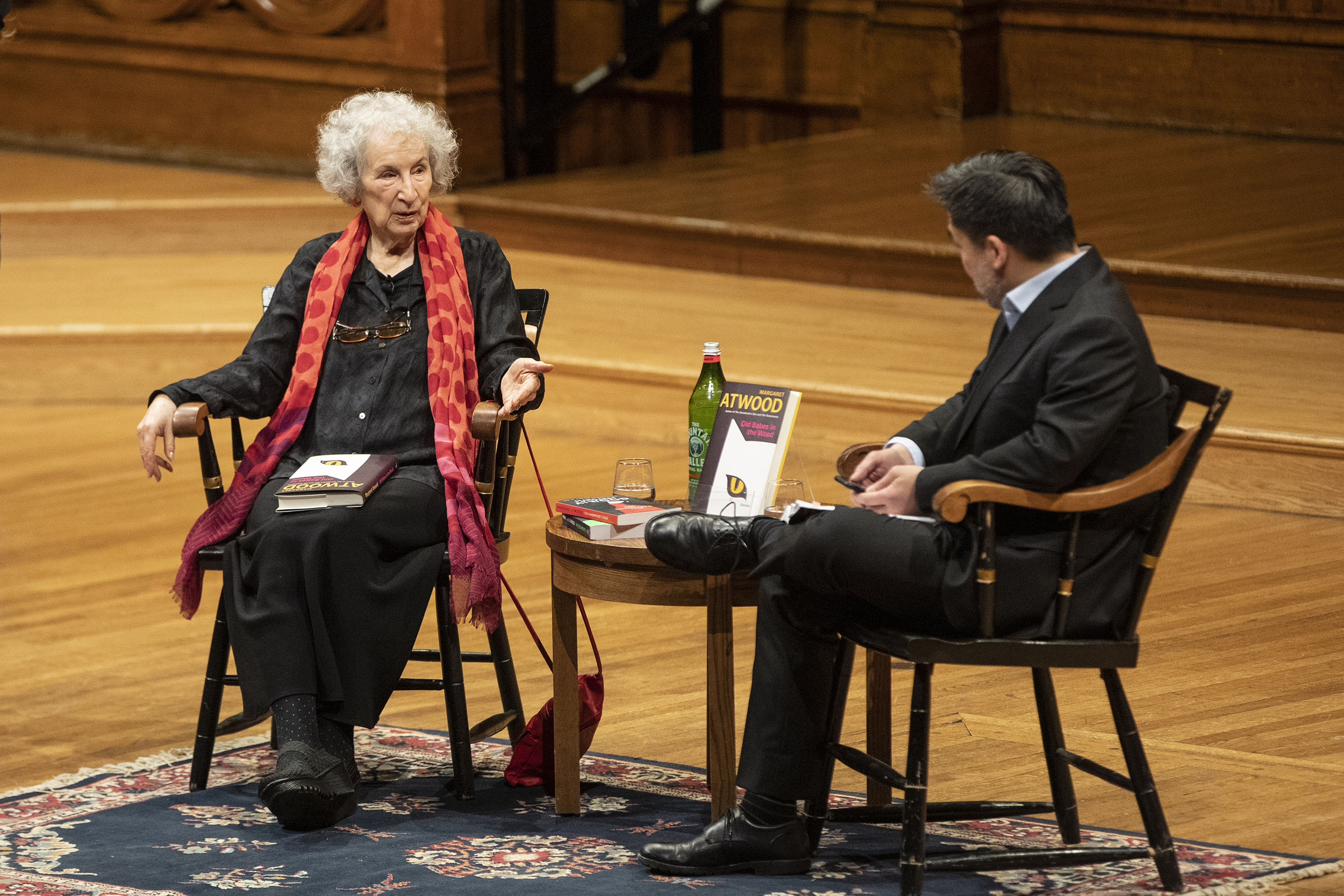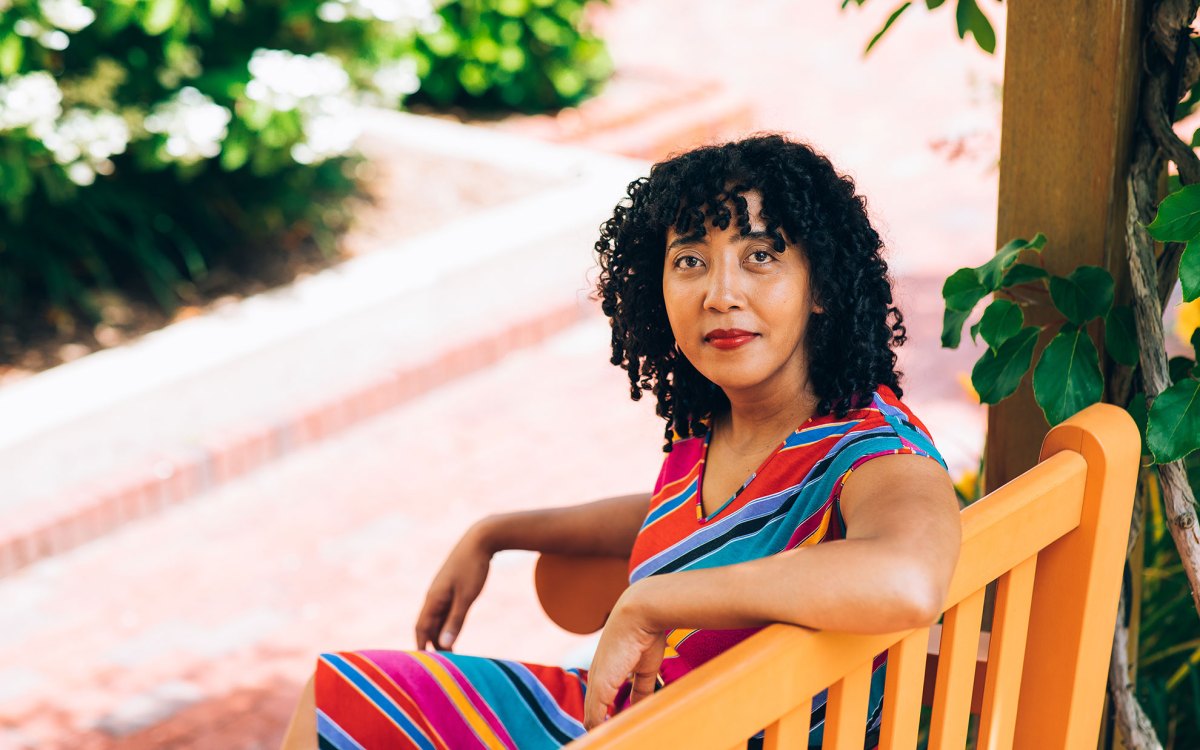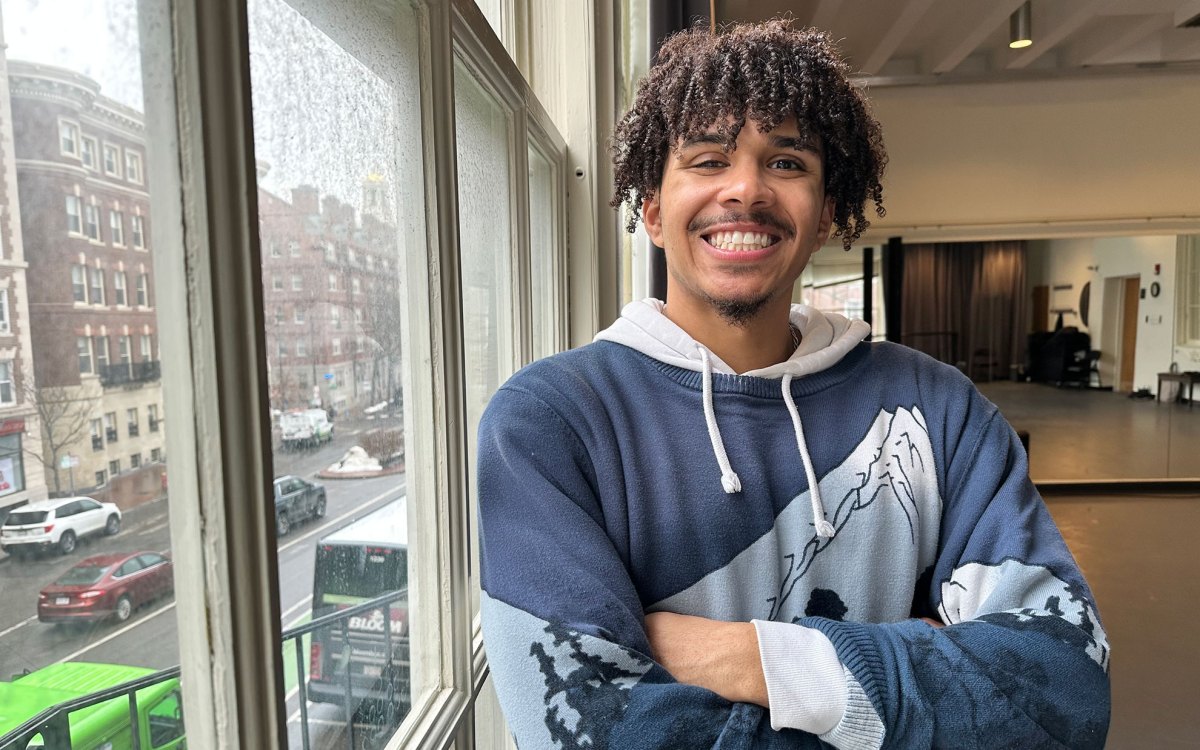
Margaret Atwood discusses her new story collection, “Old Babes in the Wood,” with WBUR Boston’s Scott Tong at Sanders Theatre.
Photo by Scott Eisen
What set them off were the bodies on wall
Acclaimed author Margaret Atwood dishes on new story collection, trials of censorship, ‘Handmaid’s Tale’ (and why they shouldn’t kill Aunt Lydia)
Margaret Atwood is certain the thing that really got to Mass Hall were all those dangling bodies.
“Harvard was not amused when [‘The Handmaid’s Tale’] was first published” in 1985, recalled the acclaimed author who received her master’s in Victorian studies from the Graduate School of Arts and Sciences in 1962. “They did not think it was fun to have bodies hanging on the Harvard wall. They took a dim view, but they have come around since.”
Pausing for effect, she added: “This isn’t Florida.” The sold-out audience roared.
Atwood, 83, whose speculative fiction about women and power has made her both a beloved feminist icon and a repeated object of censorship, returned to Harvard last Thursday as part of the Mahindra Humanities Center’s Writers Speak series. The two-time Booker Prize winner discussed her new story collection, “Old Babes in the Wood,” with WBUR Boston’s Scott Tong, an exchange that showcased her bold wit and comedic timing that deserves a Netflix special.
Some of the 15 stories are rich fantasy (an interview between a character named Margaret Atwood and author George Orwell through a medium) while others reflect the intractable losses that come in old age (of loved ones, memory, verbal filter). In “Airborne,” three elderly friends get together to sip gin and tonics and work on a plan to endow a university chair in feminist studies. Atwood writes:
“‘We’re correcting the gender balance,’ says Chrissy reproachfully. ‘Because a lot more male creatives still get the big jobs and win the awards and things. Remember that chart Darlene put together?’
“‘It’s okay, I’m teasing,’ says Leonie. ‘I get it. We’re laying the foundations for the brave new generation of emerging non-cis-male creatives, and by the way I hate creatives too. They’re not a separate class of people. Everyone’s creative!’”
Atwood confided to the audience that she still writes three pages a day — “then I can goof off and do something else” — and procrastination takes the form of addictive online solitaire (“I have to stop playing”), crossword puzzles, and an undying affection for British TV (“Miss Marple,” “Father Brown”). She confirmed what many who have watched the Hulu version of “The Handmaid’s Tale” know: Aunt Lydia, whose job it is to educate the handmaids, is a beloved character.
“I did say, at one point: ‘Don’t you dare kill Aunt Lydia. [Writer/producer Bruce Miller] said: ‘I wasn’t going to.’ I said, ‘Well, you stuck a knife in her and threw her over the banister.’ [Miller responded,] ‘She’ll recover.’ I was writing ‘The Testaments’ right then. I couldn’t have her killed off,” said Atwood, referencing her 2019 prize-winning sequel to “The Handmaid’s Tale.”
Dressed in head-to-toe black with a bright orange/red polka dot scarf, Atwood told the audience that, as one who spent as much time in Harvard’s library stacks reading witchcraft and demonology as English literature, she rarely kills characters.
“The thing that I’m still requiring of them is that they’re alive, a minimum requirement. Some people kill off everyone at the end. I’ve never actually done that. Maybe I’m working up to that. Somebody has to be there to tell the story, no matter how dismal that story may be,” she said.
More bleak may be the repeated censorship Atwood has battled for her work. The Canadian author talked about “The Handmaid’s Tale,” which was most recently banned by the Madison County school board in Virginia, who judged it too sexually explicit.
“The justification is that it has sex in it,” she said, then, pausing, added: “unlike the Bible.”
Atwood’s 90 minutes of conversation flew, and Tong closed out the evening asking the literary legend if growing old is fun.
“More fun that you think,” she replied. “At this age, you’ve got a choice. I can either be a wise old woman or wicked old witch — those are Carl Jung’s terms. And why not both?”




